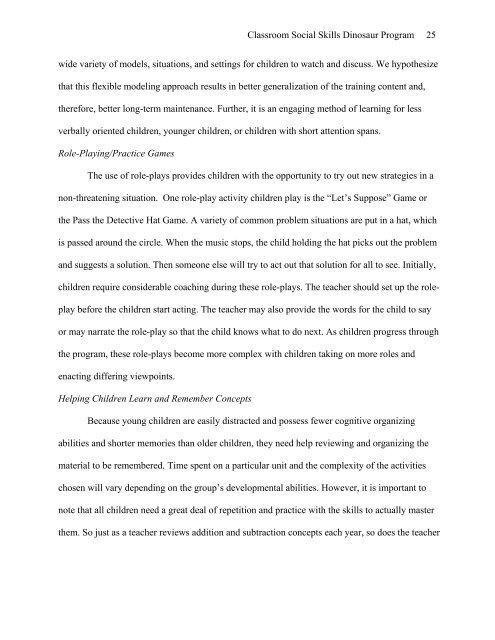Classroom Social Skills Dinosaur Program 1 Running head ...
Classroom Social Skills Dinosaur Program 1 Running head ...
Classroom Social Skills Dinosaur Program 1 Running head ...
You also want an ePaper? Increase the reach of your titles
YUMPU automatically turns print PDFs into web optimized ePapers that Google loves.
<strong>Classroom</strong> <strong>Social</strong> <strong>Skills</strong> <strong>Dinosaur</strong> <strong>Program</strong> 25<br />
wide variety of models, situations, and settings for children to watch and discuss. We hypothesize<br />
that this flexible modeling approach results in better generalization of the training content and,<br />
therefore, better long-term maintenance. Further, it is an engaging method of learning for less<br />
verbally oriented children, younger children, or children with short attention spans.<br />
Role-Playing/Practice Games<br />
The use of role-plays provides children with the opportunity to try out new strategies in a<br />
non-threatening situation. One role-play activity children play is the “Let’s Suppose” Game or<br />
the Pass the Detective Hat Game. A variety of common problem situations are put in a hat, which<br />
is passed around the circle. When the music stops, the child holding the hat picks out the problem<br />
and suggests a solution. Then someone else will try to act out that solution for all to see. Initially,<br />
children require considerable coaching during these role-plays. The teacher should set up the roleplay<br />
before the children start acting. The teacher may also provide the words for the child to say<br />
or may narrate the role-play so that the child knows what to do next. As children progress through<br />
the program, these role-plays become more complex with children taking on more roles and<br />
enacting differing viewpoints.<br />
Helping Children Learn and Remember Concepts<br />
Because young children are easily distracted and possess fewer cognitive organizing<br />
abilities and shorter memories than older children, they need help reviewing and organizing the<br />
material to be remembered. Time spent on a particular unit and the complexity of the activities<br />
chosen will vary depending on the group’s developmental abilities. However, it is important to<br />
note that all children need a great deal of repetition and practice with the skills to actually master<br />
them. So just as a teacher reviews addition and subtraction concepts each year, so does the teacher
















